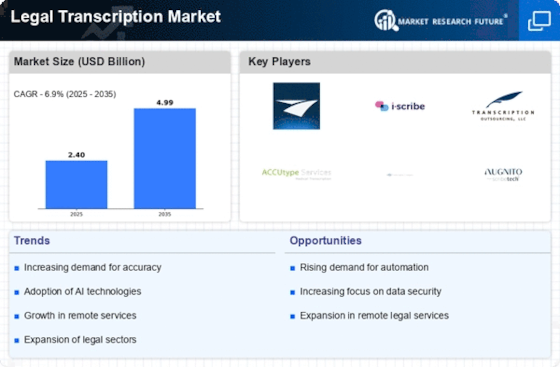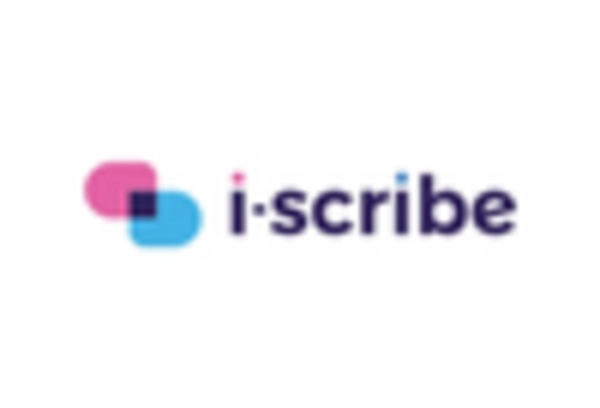Market Share
Legal Transcription Market Share Analysis
The legal transcription industry is evolving due to technology advances, changing legal procedures, and the increased demand for accurate and fast documentation. Speech recognition technology for transcribing is a major market development. Lawyers are increasingly using speech-to-text technology to transcribe courtroom, interview, and dictation records. This trend improves transcribing speed and accuracy, letting lawyers focus on analysis and strategy.
Another major development is cloud-based legal transcribing. Legal practitioners may transcribe and view documents from anywhere with an internet connection using cloud-based technologies. This trend supports legal sector digitization by offering a safe and centralized platform for transcription, document collaboration, and processes.
Legal transcribing industry developments are influenced by AI and ML integration. AI-powered transcription technologies can detect speakers, understand legal language, and learn from user edits to enhance accuracy. This trend is simplifying transcribing, saving legal professionals time reading and editing transcriptions.
Due to the sensitivity of legal documents and data protection rules, Legal Transcription is prioritizing security. To protect legal data, transcription services use strong security measures, encryption, and access limits. This trend answers legal practitioners' security concerns and protects transcribed material.
The legal industry's unique demands are driving demand for specialist legal transcribing services. Legal experts need transcriptions for court papers, depositions, and witness testimonies. Legal transcription services provide accurate and contextually appropriate transcriptions customized to legal language and processes.
Legal transcribing solutions increasingly include collaboration tools. Lawyers collaborate on transcribed documents, give input, and annotate for analysis. Legal teams may collaborate more efficiently and ensure that transcribed documents fulfill legal requirements with transcription systems featuring collaboration capabilities.
Mobile-friendly legal transcribing services are becoming popular. Legal practitioners increasingly use mobile devices for work, including transcribing. Mobile-friendly technologies help lawyers examine, modify, and access transcriptions on their smartphones or tablets, improving flexibility and efficiency in a mobile-centric workplace.
NLP technology are affecting legal transcribing industry trends. NLP helps transcription tools grasp legal language context, subtleties, and meanings. This improves transcriptions, especially for legal terms, jargon, and complicated language patterns.
Legal practitioners can focus on essential legal activities while third-party suppliers transcribe audio information quickly and accurately. Legal transcription service companies use professional legal language transcriptionists to ensure accuracy and quality. This outsourcing trend saves lawyers money and lets them handle transcribing workloads efficiently.


















Leave a Comment